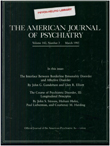Drug Use in Outpatient Treatment
Abstract
Drugs may be a useful adjunct to psychotherapy in the treatment of the neuroses, affording the patient a measure of symptom relief so that he can cope with his problems more efficiently. The author stresses, however, that appropriate drug treatment prescribed for appropriate, realistic reasons is of the greatest importance for the achievement of good therapeutic results. The anti-anxiety drugs, or minor tranquilizers, are discussed in terms of their specific efficacy in the alleviation of symptomatology and their possible side effects. The effects of social class, education, and other nondrug variables upon clinical outcome are also examined.
Access content
To read the fulltext, please use one of the options below to sign in or purchase access.- Personal login
- Institutional Login
- Sign in via OpenAthens
- Register for access
-
Please login/register if you wish to pair your device and check access availability.
Not a subscriber?
PsychiatryOnline subscription options offer access to the DSM-5 library, books, journals, CME, and patient resources. This all-in-one virtual library provides psychiatrists and mental health professionals with key resources for diagnosis, treatment, research, and professional development.
Need more help? PsychiatryOnline Customer Service may be reached by emailing [email protected] or by calling 800-368-5777 (in the U.S.) or 703-907-7322 (outside the U.S.).



